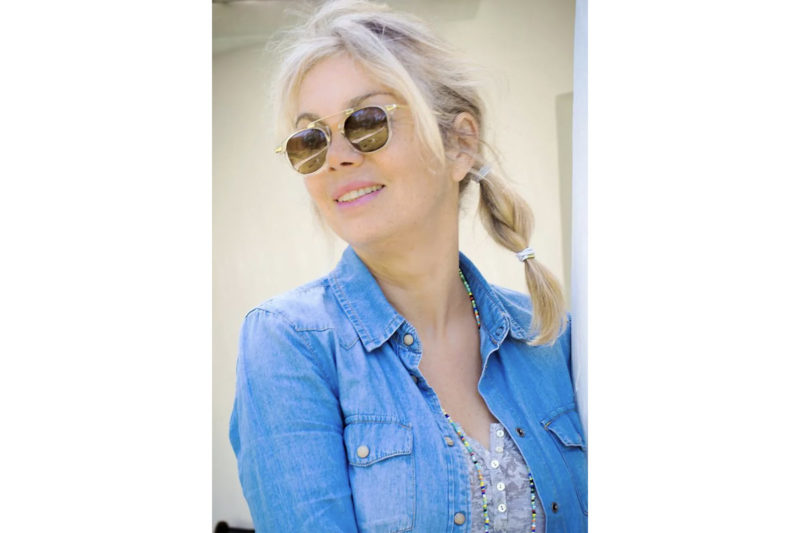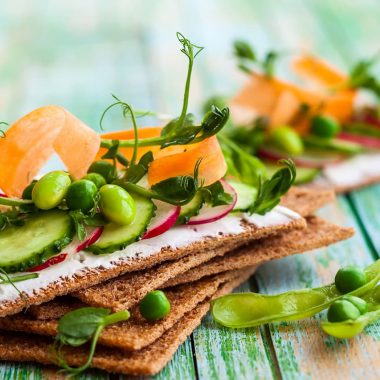After a career as a model and sales manager in the fashion industry, Céleste Candido became passionate about wellness and a balanced diet. She trained in naturopathy and the Living Food philosophy at the Wigmore Health Institute in the USA. We meet with this pioneering woman, a specialist in fasting, and learn about her principles.
1 - First of all, what kind of response did the first fasting retreats receive?
That’s more than 20 years back now. I was one of the first in France to offer fasting – the third, to be precise. I had been practising this discipline for some time and the results convinced me to change my life. I gave up fashion and couture, fields in which I had been working for several years, and went back into education to become a naturopath.
Thanks to my meeting Mireille Darc at a wellness fair, we struck up a wonderful friendship. She was a devotee of fasting, so she decided to help me publicise myself and develop this activity.
Among the general public, except for a few people who were really on board with it, fasting was considered a weight loss technique.
As for the government, Miviludes, the authority that observes and analyses sects and the like, had classed me as the architect of a harmless sect. A classification that had no consequences.
2 - On your retreats you advocate a new way of life. What does it look like?
Thanks to my naturopathy studies, I became interested in all things wellness related. I was fascinated by the human body, and wanted to learn more and more about it. While doing so, I lived by the principles myself. I soon found that this way of life brought me back to basics and common sense: behaving responsibly as a person and as a consumer; taking my time; eating well; walking; hiking; sunbathing; swimming in the sea; and respecting myself, other people and nature.
3 – You believe digestion time is one of the keys to healthy eating. Why is that?
First of all, note that the digestion of some foods starts in the mouth even though the stomach has its own digestion timeline to abide by, which is obvious and logical.
While we are digesting food, we cannot ingest other foods because the chemical processing is already underway. Also, since different foods are digested in different places, there are different digestion timelines to abide by. Any foodstuff that is not in the right place at the right time will get stuck and spark off conflicts in the digestive system.
4 – You recommend getting into the habit of drinking before meals. What is the reason to that?
The keys to healthy eating kick in before your meal. Get settled and take some time out for yourself. I recommend drinking water ten minutes before a meal to make sure that it is “bioavailable”. Moreover, that way, the gastric juices that do the digesting don’t get diluted, which retains the energy gained. Then, digestion happens over a shorter period without bloating, trapped wind or the need to take a nap being felt.
5 – As far as fruit is concerned, is it correct that you advise eating it in the morning and between meals?
The reason for eating fruit in the morning and between meals is that fruit does not need digestive enzymes to be assimilated by our bodies. Because fruit itself has a very high enzyme content. That is why it perishes easily in transit and storage. If piece of fruit gets handled too much or is squashed in with others too tightly, it starts to digest itself (and so ripen) too quickly.
When we chew fruit, at a body temperature of 37°, the enzymes that develop are self-sufficient. It then becomes very tricky to mix them in with other foods that are not assimilated in the same way. I’m thinking of animal protein, which remains in the digestive system for 3 to 4 hours, and seafood which remains in the stomach for 8 hours, whereas starches and fats only spend 1.5 hours there. These mixtures soon start to ferment, leading to trapped wind, bloating and loss of energy. However, there are exceptions such as apples paired with starches, and pineapple or papaya with animal protein, which improve digestion.
6 – You mix raw and cooked foods. Why is that?
Eating both raw and cooked foods is very important. First off, raw food makes you feel full because it forces you to chew and stops hunger in its tracks for a while. It takes about 20 minutes for that fullness signal to arrive. Don’t forget that precious vitamins are lost during the cooking process, so cooked vegetables and fruit are devoid of them. I am a fan of raw food, which is not an option for some people in terms of energy. Because weary intestines have difficulty digesting raw dietary fibre.
7 – You advise eating animal protein only once a day, preferably in the evening. Why is that?
We eat too much animal protein, which acidifies the body and generates a lot of waste. For example, 100g of steak provides 17g of protein, but 30% of the energy intake supplied by it is used for digestion. To keep the acid-alkaline balance right, it is advisable to eat protein with leafy vegetables, and also a little of something starchy.
Eating protein with vegetables, preferably in the evening, helps with weight loss. It is also not liable to spark off conflicts in the digestive system. Be sure to wait at least 12 hours between the end of dinner and breakfast. This is a dietary rule to stick to all the time. And if you eat dinner too late, skip breakfast the next day, but make up for it at lunch. Keeping these 12 hours clear allows the body to regenerate itself and gives it time to excrete what it needs to.
8 – Is it correct that you also recommend avoiding sugar at the end of a meal?
Sugar at the end of the meal is a little disaster that will spark off fermentation in the stomach and intestine. The result is rapid loss of energy, trapped wind, bloating and acidification of the body.
9 – Is it correct that you also shun processed foods?
Processed foods are low in nutrients and high in sugar. The process of refining grains and sugar alters dietary fibre and the acid-alkaline balance. This means that sugars are absorbed more quickly and have a higher glycaemic index, which leads to cravings and weight gain.
Other refined foods like oil and salt, which cannot be assimilated, acidify the body.
To keep the body’s acid-alkaline balance right, we draw on our alkaline reserves: the bones and teeth. This leads to depletion of minerals in the body.
10 - Diet aside, what are your other recommendations?
Physical exercise and stress management. Regular physical exercise boosts vitality, and therefore the ability to excrete what needs to be excreted. Breathing in a place with high-quality oxygen burns off light acids from cereals more effectively. I recommend practising yoga or Qi Gong, and also taking a brisk walk lasting more than 30 minutes, or dancing alone or with others with the window open, overlooking a garden, woodland or the sea.
Stress management can be achieved with cardiac coherence. It’s easy, takes just 5 minutes two to three times a day, and is a real little gem for your health. This special type of breath work loads the body up with dopamine. This leaves you calm and happy, and regulates blood pressure. Practising it regularly lowers cortisol levels and raises those of DHA, the youthfulness hormone. And it’s goodbye to premenstrual symptoms such as irritability and depression. With this cardiac coherence technique, sleep is improved and so is emotional regulation. I was lucky enough to meet David Servan Schreiber, who introduced this technique to me, and I have been practising it for over 20 years now.
Tenerife, Brittany, Crans-sur-Sierre, Formentera… Go ahead and take a look at the health retreats centred on fasting put together by Céleste Candido.
Reading material: ABC du Jeûne [The basics of fasting] by Céleste Candido (Éditions Grancher, available only in English).







